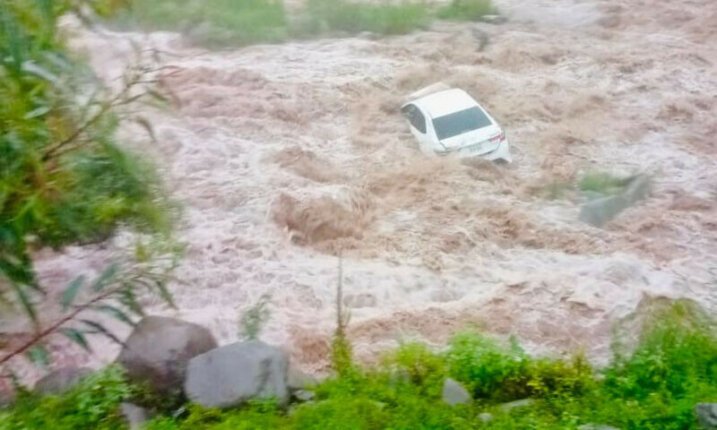Heavy monsoon rains have unleashed deadly floods across Azad Jammu and Kashmir (AJK) and Gilgit-Baltistan (G-B), killing at least 10 people — including women — and leaving hundreds stranded in remote valleys.
In Muzaffarabad, a powerful cloudburst claimed the lives of five family members. In Neelum Valley, 50 stranded tourists were rescued from Ratti Gali Nullah, but nearly 500 remain trapped at the base camp after bridges were destroyed and roads cut off by floodwaters.
In G-B’s Ghizer district, five people were swept away by floods in Khalti. Two bodies — a woman and a child — have been recovered, while the search for three others continues. Six homes have been destroyed, and flash floods in Chitorkhand and Dain Nullah have blocked the Ishkoman River, forcing evacuations from low-lying areas.
The State Disaster Management Authority (SDMA) confirmed more casualties: a woman killed by falling rocks in Dana Daliyaar, and another woman killed in Pulandri Nullah. Infrastructure damage includes the destruction of three shops and a watermill in Jhelum Valley, as well as landslides blocking major roads such as the Muzaffarabad–KP link and access to Leepa Valley.
In Bagh district, about 400 tourists stranded in floodwaters were rescued. In Nathiagali, heavy rains led to three girls drowning in Gilyat Tajwal; two survived, but one died. Floods have also washed away two pedestrian bridges in Nullah Lawat.
The Pakistan Meteorological Department (PMD) has issued a fresh warning over rising temperatures in G-B — 7–9°C above normal — accelerating glacier and snow melt. This raises the threat of Glacial Lake Outburst Floods (GLOFs) that could devastate downstream areas.
The Karakoram Highway has been blocked at multiple points, leaving commuters stranded for hours. Local rivers and streams, including the River Door, have swelled beyond capacity, inundating low-lying areas and dumping debris onto major roads.
Authorities are urging residents and travellers to remain alert as monsoon rains continue, with rescue and relief teams on standby to respond to emergencies.



